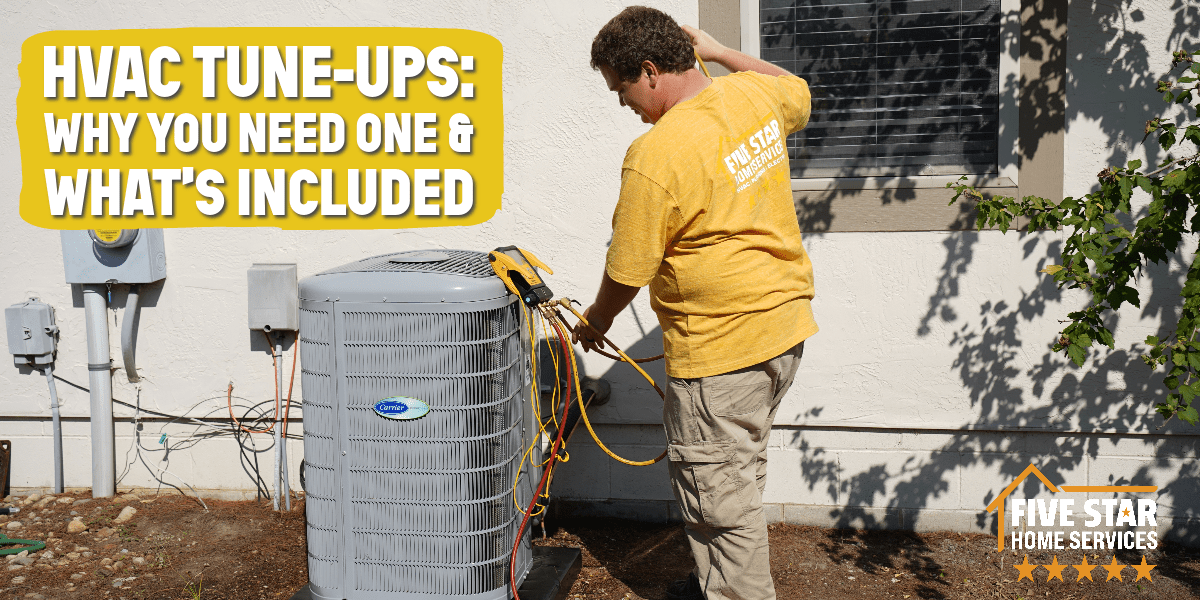Keeping up on your air conditioner, heat pump, or furnace is necessary to ensure efficient operation and comfortable airflow. We walk through the routine tune-up steps we at Five Star Home Services perform during a maintenance call and address common questions in this article.
Oh, the joys of owning a home . . .

We have our plumbing systems and electrical systems, and let’s not forget our all-important HVAC systems. Without our home comfort systems, where would we be?
Having said that, we say this all the time so it should come as no surprise, that your home comfort system needs care to provide the cool and heated air you depend on.
It’s simple really: When you take care of your HVAC system, it takes care of you. Simple, right?
Maybe not.
Perhaps you have a newer system that you know is firing on all cylinders. The heating is great. Cooling is crisp. No worries, right? Wrong. You still need maintenance. You still need a tune-up. You still need a professional to come over and keep an eye on everything each year. Maybe not today. Maybe not tomorrow. But sometimes within the next year, and probably sooner unless you’ve had one performed recently, you will need maintenance. You will need a tune-up. It’s better you come to terms with this as quickly as possible. This is a cold hard fact of owning a home. HVAC tune-ups and maintenance are necessary every single year. Sure, there are fees associated with a tune-up. But it’s nothing compared to the costs of ignoring this valuable HVAC service.
In the following, we’re going to elaborate on this matter further to put this issue to rest once and for all.
We’re going to unpack each of these statements below. Why get a tune-up? When to schedule it? What’s included? How much does a tune-up cost? What should you be preparing before your tune-up?
Why Get an HVAC Tune-up?
When it comes to HVAC equipment, the most dangerous problems aren’t obvious. Seldom do you have to worry about the equipment noise that keeps you up at night, or your living room being colder than other rooms in the wintertime. Rather, the most dangerous problems are the ones that creep up on you and catch you off-guard. They are the silent killers, which include things like the air filter that isn’t replaced as regularly as it should be. When you have a clogged air filter, the long-term wear and tear won’t seem like much day-to-day, but when your yearly utility bills are hundreds of dollars more, or when your system breaks down in year 12 instead of year 20, that’s when you’ll see the difference. That’s when you’ll see why this preventative measure truly pays.
Air filter changes are something almost all homeowners know about. Nevertheless, condenser coils are a little less well-known. How clean is your condenser coil? Are the settings on your blower fan matched properly to the air conditioner’s stage options? Are all the crossover channels between your burners functioning properly, or is one of them not lighting?
If you weren’t sure of the answers or weren’t even sure what those questions referred to, you aren’t alone. No worries! Five Star to the rescue! Almost all HVAC systems are fairly complicated. It’s not your job to know everything about their operation. However, it is your responsibility to work with someone who does, to keep everything running safely and efficiently. You do this by keeping us on speed dial! Make sure to follow our recommendations and have us visit your home at least once a year for a service we are practically giving away – a service that pays for itself!
The key idea here is that tune-ups are preventative measures. They are essential too. More than that, they are also optimizing your yearly comfort.
So if we go back to that example of cleaning your condenser? Dirty condensers rob you of approximately 10% efficiency for each year if you ignore it. This equates to a lot less cooling for your home, which means higher bills, and more work for your equipment. In short, it’s hard to envision those benefits in the first year, since 10% is sometimes tough to notice. As the problems compound, though, the cost of a service visit will seem like nothing in comparison
What’s Involved in an HVAC Tune-up?
That depends on several factors. We provide a list below of some common tasks, but at least some of it is going to be catered to the specific HVAC system being serviced and the concerns of the homeowner. Our friendly technicians will ask various questions to get a sense of how the air conditioner and/or furnace is operating. These questions could include the following:
- Are there any smells?
- Are you hearing any new noises?
- Is it any louder than usual when it’s on?
- Is a particular room too hot or cold?
- What’s the humidity like in the winter? Too dry?
- How about the summer? Is it too humid?
- Are you struggling with any of the thermostat controls?
- Is this because the controls are confusing, or is something not working properly?
Most importantly, we want to make sure we always address the concerns of the customer. Questions like these accomplish that goal. However, not every customer will know what needs to be done with their system. This is where routine maintenance tasks are invaluable. Among these tasks, you might see the following:
- Checking air filters, and replacing them when necessary.
- Checking airflow from the blower fan, which maintains airflow for both heating and air conditioning.
- Checking pressure levels according to the manufacturer’s standards. Various pressures might need to be inspected, such as gas pressure, static pressure, refrigerant pressure, exhaust pressure, and air pressure.
- If pressure adjustments need to be made, make them.
- Basic operation of the system, inspecting for noises or air leaks
- Inspection of the burners (furnace only) to ensure crossover channels are operating properly. If one of these fails, your furnace will generally still run, but not as efficiently.
- Check for carbon monoxide — both inside the exhaust and inside the home (any time the furnace is adjusted, these levels need to be checked).
- Although this list isn’t exhaustive, it will also include items based on customer responses to the questions above. The list represents several common tune-up functions, however, which should be performed at least once every year for HVAC systems.
How to Prepare For a Tune-Up?
Because your equipment is being worked on by an expert, homeowners don’t have to do much to prepare for a service visit. And while the recommended prep work is minimal, there are two primary things you should do:
- Make sure the areas around your equipment are cleared out, for easy access.
- Prepare questions based on any comfort concerns you have with your system.
That first one is good advice in general. If you have plants growing into your outdoor air conditioning unit, or boxes leaning against your furnace, it can easily become a hazard. Nevertheless, in the short-term, it will also allow for an efficient visit from your HVAC provider at Five Star.
Common HVAC Tune-Up Questions
Now you might wonder: What sort of questions should I be asking? The most truthful is “any that you would like answered.” There are no bad questions.
Having said that, we get a lot of similar questions regarding HVAC tune-ups. Listed below we have provided a handful (along with brief answers), to spark other ideas for questions you can ask an HVAC technician.
My System Uses R22 Refrigerant. Can It Still Be Replaced?
Yes. We’ve covered this in other blogs. All new production and imports of R22 refrigerant have been banned in the US since 2020. However, any existing R22 refrigerant can still be used to service new systems. Keep in mind the supply is going down.
On the bright side, if your AC system isn’t leaking, the R22 you have could last you for many years to come. Unless there is a leak that refrigerant will need to be added, either periodically if the leak isn’t fixed, or a single time once the leak has been repaired. The downside is that the R22 ban means that R22 is getting more expensive quickly. So you will need to plan accordingly.
Do refrigerant leaks need to be repaired immediately?
Not necessarily. However, it will cost you money in energy efficiency if it’s not dealt with in a timely manner. Keep in mind that the severity of the leak is the biggest determining factor in this. Minor leaks only require a refrigerant “top-up” every couple years. Additionally, other leaks are severe enough that your refrigerant will be empty after weeks or even as quickly as days.
In more severe cases — absolutely, repairs need to happen. Full system replacement might even be necessary if the equipment is already old. In the less severe cases, it’s often the homeowner’s choice.
How often does my HVAC air filter need to be changed? Is once a year enough?
air quality in your area, and whether anyone in your home suffers from allergies. A standard rule of thumb is to replace pleated filters every 90 days. However, if you have pets, suffer from allergies, or live in a particularly dusty area, it might be beneficial to change the filter more often, perhaps every 60 days. Once a year is definitely not enough and could lead to reduced HVAC efficiency and indoor air quality.
How often should I have an HVAC tune-up?
It’s generally recommended to have your HVAC system checked and tuned up twice a year: once in the spring for your cooling system, and again in the fall for your heating system. These regular tune-ups can help identify potential issues before they become serious problems, ensure that your system is running at peak efficiency, and prolong the lifecycle of your HVAC unit.
Additionally, regular maintenance of your HVAC system can save you money in the long run. A system that runs efficiently uses less energy, which translates to lower utility bills. Moreover, spotting minor issues early on can prevent expensive repairs or even the need for a complete system replacement in the future. Thus, the relatively small expense of regular check-ups can provide significant financial savings over time.
What’s the difference between a diagnostic and a tune-up?
A diagnostic and a tune-up are two different procedures performed on vehicles, each with a distinct purpose. A diagnostic is an analysis conducted to identify any existing problems with the car’s systems or components. It involves using specialized software and tools to read error codes from the vehicle’s computer system. On the other hand, a tune-up is a preventative maintenance routine. It typically includes replacing spark plugs, adjusting valves, cleaning or replacing air filters, and checking or changing the engine oil. Essentially, while a diagnostic determines if there’s an issue, a tune-up is aimed at preventing future issues from arising.
Both diagnostics and tune-ups are integral for the longevity of a vehicle. Regular diagnostics can detect issues early before they evolve into potentially expensive repairs. They help maintain the vehicle’s health by identifying areas of concern and offering a course of action for rectification. Tune-ups, on the other hand, ensure that the vehicle operates at its optimum level. They can improve performance, increase fuel efficiency, and extend the vehicle’s lifespan. Thus, a combination of regular diagnostics and tune-ups forms a comprehensive maintenance strategy that keeps your vehicle running smoothly and efficiently.
How much does an HVAC tune-up cost?
The cost of an HVAC tune-up can vary significantly based on several factors, including your location, the complexity of the job, and whether any additional repairs are needed. On average, homeowners might expect to pay somewhere between $70 to $200 for a standard HVAC tune-up. Please note that this is a rough estimate, and the actual costs may vary. Always consult with a professional HVAC service provider for an accurate quote.
Five Star Whole Home Protect Plans
$19.95 per Month or $239 yearly – 3 Star Protect Plan (HVAC Only) Includes:
- Annual Heating System Safety Check (Value $99)
- Annual Cooling System Safety Check (Value $99)
- New Equipment Discount: 5% Off
- Indoor Air Quality Products Discount: 5% Off
- Service Discount: 5% Off
$29.95 per Month or $359 Yearly – 4 Star Protect Plan (HVAC Only) Includes:
- Annual Heating System Cleaning + Tune-Up (Value $179)
- Annual Cooling System Cleaning + Tune-Up (Value $179)
- New Equipment Discount: 5% Off
- Indoor Air Quality Products Discount: 5% Off
- Service Discount: 10% Off
- Online Filter Order Discount: 10% Off
- Diagnostic Service Call Discount: 50% Off
$39.95 per Month or $479 Yearly – 5 Star Whole Home Protect Plan Includes:
*Electrical Inspection Call (Electrician), Plumbing Inspection and Cleaning (Plumber), HVAC Tune-Up and Cleaning (HVAC Technician)
- Annual Heating System Cleaning + Tune-Up (Value $179/ea)
- Annual Cooling System Cleaning + Tune-Up (Value $179/ea)
- New Equipment Discount: 10% Off
- Indoor Air Quality Products Discount: 10% Off
- Service Discount: 10% Off
- Online Filter Order Discount: 10% Off
- Diagnostic Service Call Discount: 50% Off
- Tankless Water Heater De-Scaling: 50% Off
- Priority Scheduling
- Annual Plumbing Inspection
- Inspect + Flush Tank Water Heater
- Inspect + Check Sump Pump
- Inspect + Check Water Softener
- Annual Electrical Safety Check
- Inspect + Check Electrical Panel
- Inspect + Check Indoor/Outdoor Receptacles
- Inspect + Check Batteries in Smoke and Carbon Monoxide Detectors
Getting Your Money’s Worth
Whenever you have a new HVAC system installed, or even when you move into a home with an existing HVAC system, it’s an investment that you are going to need to last you for many years. The only way to ensure this is to be proactive and have tune-ups performed. If this doesn’t convince you, consider this: The difference in lifespan between a well-maintained system and a neglected one can be up to 10 years or more! That’s a full decade sooner that you’re going to have to buy a new system, and even until it dies, a neglected system will run far less efficiently with inferior comfort levels and excessive costs.
Having said that, are you now ready to schedule your tune-up with Five Star Home Services? If so, we’re ready to help. If you’re in Columbus, Dayton, or Cincinnati, OH, or the surrounding areas needing HVAC tune-up or HVAC maintenance, give us a call today at (833) 405-8009.

